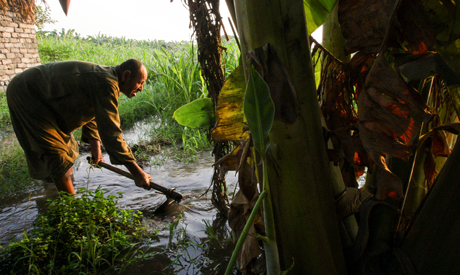Egypt: No more ‘easy water’

In an attempt to expand the safe reuse of wastewater in the Middle East and North Africa, ReWater MENA, which addresses barriers to water reuse in the region, held a workshop in Egypt meant to build and strengthen the capacities of various stakeholders and participants in the country.
The workshop was held in cooperation with the Arab Countries Water Utilities Association (ACWUA), a regional organisation of water supply and sanitation utilities from the Arab countries based in Amman, Jordan.
AcEgypt, Jordan, and Lebanon are involved in ReWater MENA. According to the regional project manager of ReWater in the Middle East and North Africa (MENA) Nessrin Lahaam, each of these countries has different needs and different levels of advancements.
“The project aims to expand the safe reuse of treated wastewater in MENA region by addressing barriers to reuse and identifying validated reuse models through building the capacities of 400 trainees in the three countries, Jordan, Egypt, and Lebanon,” Lahaam said.
The project provides various outputs that contribute to water reuse improvement and expansion in the MENA region. One of the main outputs of ReWater is the Source Book, Lahaam said, which will serve as the first regional reference book for reuse in MENA.
ReWater MENA is funded by the Swedish International Development Cooperation Agency (SIDA), and led by the International Water Management Institute (IWMI).
Water reuse is of particular importance to Egypt since it has one of the world’s lowest annual per capita water share. Egypt’s per capita share of water currently stands at below the international standard of 1,000 cbm/year, with the country taking 600 cbm/year, Sayed Abdel-Hafez, chief researcher at Soil and Water research Institute (SWRI), told Al-Ahram Weekly.
Hafez said that double treated wastewater is used in Egypt to water trees that produce oil for train engines and irrigation of crops for fibers like linen and cotton. It is also used in irrigation of the green belt around Greater Cairo governorates, decorative plants, parks, and parking areas.
However, he said it was forbidden to use water in irrigation of vegetables and fruits that are eaten fresh. Hafez said he believed that the project encourages the development of wastewater treatment processes and could reach triple its treatment and be used in planting strategic crops like wheat, maize and clover. According to Hafez, some Gulf countries succeeded in irrigating vegetables and trees with wastewater after the triple treatment process.
But the water sector still has challenges. Rifaat Abdel-Wahab, head of the Research and Development Sector at the Holding Company for Water and Waste Water (HCWW), said the biggest challenge for indirect reuse in the Delta has been the mixed sources of waste streams that discharge untreated water into agricultural drains.
But to what extent is the reuse of wastewater acceptable? “There is a need for hard work to change the perspective towards water reuse in the Arab region at the socio-technical sides,” Hussein Al-Atfi, secretary-general of the Arab Water Council (AWC) said.
Al-Atfi said water and food security in Egypt and the Arab region are under major threat, therefore moving faster to adopt unconventional water resources including treated wastewater, desalinated water, and brackish water is a must.
That is why the stakeholders’ acceptance and gender mainstreaming for water reuse projects are very important, according to Nora Abdel-Wahab, a regional gender consultant.
Abdel-Wahab told the Weekly, “Raising awareness among women and social acceptance to the idea itself will help a lot in the increase of treating used water on a large scale which will lead to drinking water availability as 80 per cent of water in Egypt goes to agriculture.”
In 2005 the Ministry of Housing issued the Egyptian code for reuse of wastewater and amended it in 2015 in cooperation with the sectors concerned with the water system in Egypt, according to Mohamed Ismail, director of the Reference Waste Lab at HCWW. Ismail told the Weekly that 15 per cent of the treated wastewater is directly used in the lands specified for the HCWW.
“To increase that rate, some of the sewage stations are moving to the triple treatment process to increase the benefits of treated water and expand its usage in agriculture according to the Egyptian code,” Ismail said.
Wastewater presents a great potential for bridging the supply-demand gap as it is the only water source which increases as the population grows, according to Amgad Al-Mahdi, head of IWMI in the MENA office. Al-Mahdi refers to wastewater as an “untapped resource”. The use of treated wastewater in agriculture is considered one of the most sustainable alternatives to cope with water scarcity, especially considering that agriculture accounts for 80 per cent of the region’s freshwater withdrawals,” Al-Mahdi said.
Adding to population growth, according to Al-Atfi, haphazard urbanisation, Covid-19, and climate change are dynamic challenges that are increasing competition over water resources between and within different sectors. Wastewater is the only sustainable water resource. About 30 per cent of wastewater in the Arab region is treated, but only a fraction of that amount is reused.
Al-Atfi said there was an urgent need to develop the technological side that fits with the local needs of the Arab region. “Jordan is a great example of water reuse in the Arab region, where the per capita water share per year is around 100 cubic metres,” he added.
“There is a need for hard work to change the perspective towards water reuse in the Arab region at the socio-technical sides. The time of easy water is over,” Al-Atfi said.
This article was originally published on https://english.ahram.org.eg
